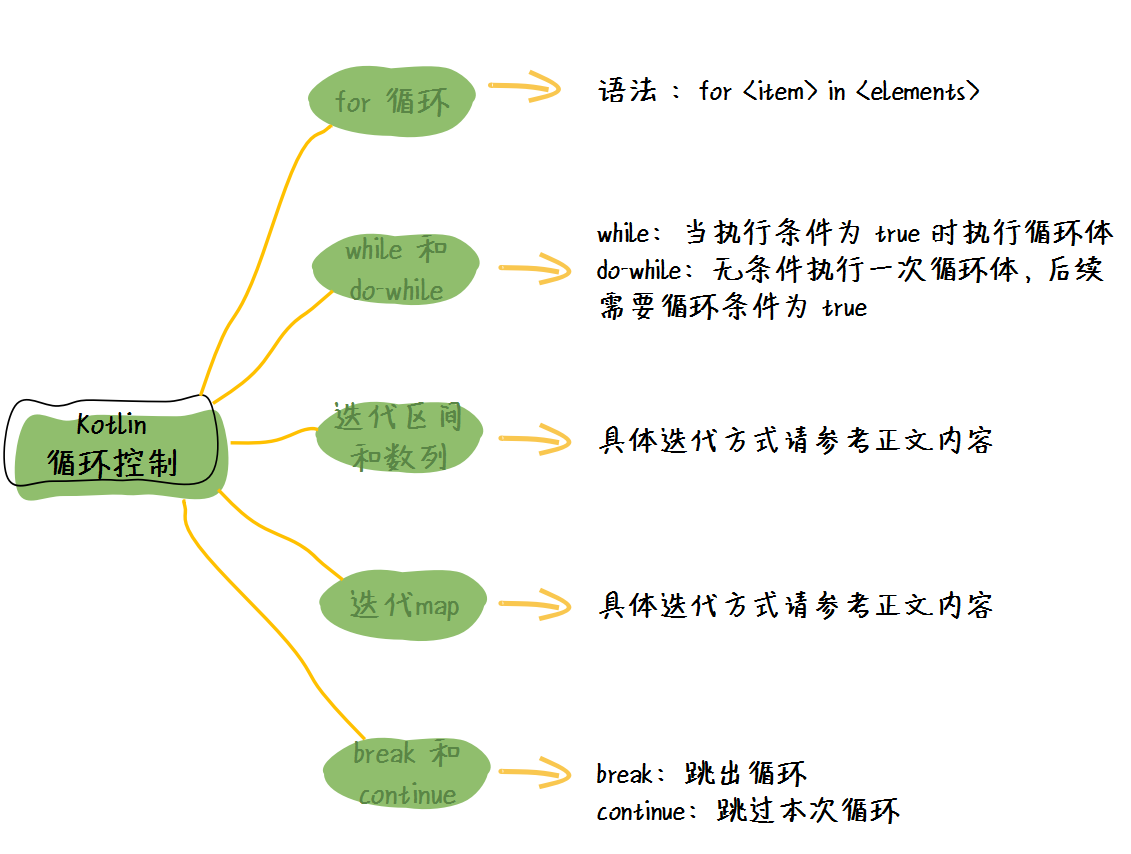Kotlin 循环控制
循环控制语句也是每门语言不可缺少的一部分,一般就是我们所熟知的 for、while、do-while。Kotlin 循环其实几乎和 Java中 的一模一样。
1. for 循环
for 循环 可以对任何提供迭代器(iterator)的对象进行遍历,for 循环仅以唯一一种形式存在, 和 Java的 for-each 循环一致。其写法for <item> in <elements>和 C# 一样。和 Java 类似,循环最常见的应用就是迭代集合,具体语法如下:
for (item in list) println(item)
//循环体还可以是个代码块
for (item in list) {
//...
}
val items = listOf("java", "kotlin", "android")
//for-in遍历
for (item in items) {//for遍历集合
println("lang $item")
}
//遍历索引
for (index in items.indices) {//类似于java中的数组的length-index的遍历
println("The $index index is ${items[index]}")
}
2. while 和 do-while 循环
Kotlin 中 while和do-while 循环,它们的语法和 Java 中相应的循环没什么区别:
//当condition为true时执行循环体
while(condition) {
/\*...\*/
}
//循环体第一次会无条件地执行。此后,当condition为true时才执行
do {
/\*...\*/
} while (condition)
val items = listOf("java", "kotlin", "android")
var index = 0
while (index < items.size) {//while 循环的遍历方式
println("The $index lang is ${items[index++]}")
}
3. 迭代区间和数列
如上所述,for 可以循环遍历任何提供了迭代器的对象。即:有一个成员函数或者扩展函数 iterator(),它的返回类型,有一个成员函数或者扩展函数 next(),并且有一个成员函数或者扩展函数 hasNext() 返回 Boolean。
如需在数字区间上迭代,请使用区间表达式:
for (i in 1..10) {//遍历区间,注意Kotlin的区间的包含或是闭合的。
print("$i ")
}
//输出结果: 1 2 3 4 5 6 7 8 9 10
for (i in 1 until 10) {
print("$i ")
}
//输出结果: 1 2 3 4 5 6 7 8 9
for (i in 10 downTo 1 step 2) {
print("$i ")
}
//输出结果: 10 8 6 4 2
对区间或者数组的 for 循环会被编译为并不创建迭代器的基于索引的循环。
如果想要通过索引遍历一个数组或者一个 list,可以这么做:
for (i in array.indices) {//遍历索引
println(array[i])
}
或者可以用库函数 withIndex:
for ((index, value) in array.withIndex()) {
println("the element at $index is $value")
}
4. 迭代 map
在 Kotlin 使用 for...in 循环的最常见的场景迭代集合, 可以使用 for-in 来迭代 map。
val binaryReps = mutableMapOf<Char, String>()
for(char in 'A'..'F') {
val binary = Integer.toBinaryString(char.toInt())
binaryReps[char] = binary
}
for((letter, binary) in binaryReps) { //for-in 遍历map
println("$letter = $binary")
}
5. 循环中的 break 与 continue
在循环中 Kotlin 支类似 Java 中 break 和 continue 操作符。
- break:终止最直接包围它的循环;
- continue:继续下一次最直接包围它的循环。
for (i in 1..100) {
if (i % 2 == 0) continue // 如果 i 能整除于 2,跳出本次循环,否则进入下层循环
for (j in 1..100) {
if (j < 50) break // 如果 j 小于 50 ,终止循环。
}
}
6. 小结
到这里有关 Kotlin 中的循环控制就结束了,基础语法篇也就结束了,下一篇我们将进入 Kotlin 中的高级语法篇。
